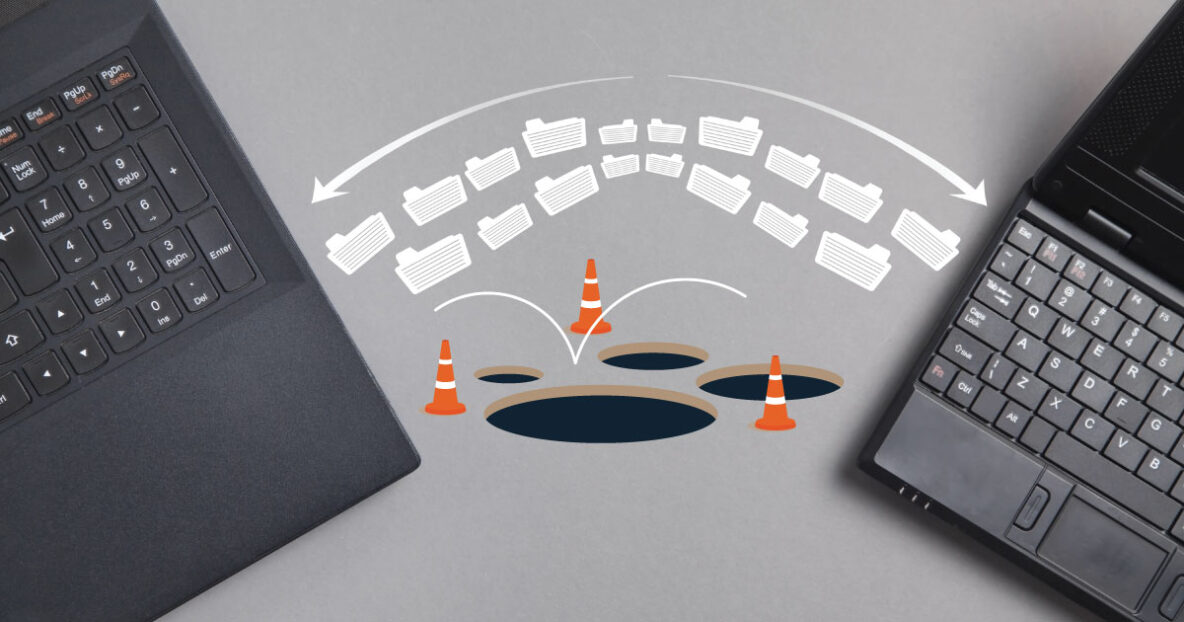Law firms, even small and mid-sized firms, are not immune to the risks of rising cyberattacks. At least 25% of law firms have experienced a data breach—and even more concerningly, another 20% don’t know whether they’ve been breached or not.
Attorneys have a legal and ethical obligation to safeguard client data and protect client confidentiality. If they don’t, they could be found in breach of compliance regulations. Data breaches don’t just cause trouble with the state bar, they also result in costly inefficiencies, client dissatisfaction, and lost business.
Attorneys share files with outside parties every day, but this practice creates a significant vulnerability for firms trying to safeguard client information. Standard file sharing practices have four major pitfalls, but all can be avoided by adopting a secure file sharing solution.
Pitfall #1: Emails can be easily hacked, intercepted, or shared
As cyberattacks have gotten more advanced, traditional methods of securing emails, like password protection, have become less effective.
Email attachments that are not protected using robust security methods, like secure links and high-level encryption, are vulnerable to attack. While email attachments containing pictures of your pets or a PDF of your gym’s yoga schedule might not be a hacker’s first target, email attachments containing personal information, like client names, social security numbers, or matter details, can cause lasting damage if involved in a cyberattack.
Email attachments are also vulnerable to user error. Have you ever hit “reply all” by accident? Then you know how easy it is to accidentally send an email—potentially containing private, personal information—to the wrong party. Moreover, even if you treat client data carefully, there’s no telling what might happen after the email attachment leaves your firm. Clients or other outside parties may experience their own data breach or accidentally share data with the wrong party.
Secure file-sharing software provides you and your clients with the peace of mind that information will be protected, even if your firm is the target of a cyberattack. By providing advanced safeguards against data breaches, firms minimize the financial and reputational risk of sharing legal documents.
Pitfall #2: Permanent data loss if a server crashes
Most legal files are no longer kept as paper copies in office filing cabinets for security reasons—after all, paper files were subject to theft, fire, or misplacement. But since many firms don’t perform regular data backups, online legal documents are just as vulnerable. Legal files shared online can easily be lost if a server crashes, a computer is stolen, or a cyberattack wipes company data.
Secure legal file sharing software mitigates this risk by regularly backing up all legal data.
Legal software backs up all matter data at a frequency you determine, and it can perform backups after hours to prevent a disruption in the workday. This practice ensures copies of all private client data are maintained, even if a breach occurs.
Pitfall #3: Large files can’t be shared electronically
You probably don’t want to send large legal contracts in the mail, where they can be intercepted and opened, but they’re too big to share with clients via email. How do you transmit large documents without leaving them vulnerable to mishandling?
Send files of any type or size with secure file-sharing software.
Secure file transfer methods allow you to share documents of any size with an encrypted link, keeping documents private and saving your firm money in printing and shipping fees.
Pitfall #4: Secure client portals don’t work well for all users
Many firms have adopted secure client portals to help mitigate file-sharing risk and send both large and small legal files safely and securely. Client portals allow firms to securely share documents, emails, large files (like copies of video depositions), and even invoices with clients.
Just having a client portal isn’t enough, though—clients actually need to use it for the portal to be effective.
Unfortunately, some clients struggle to adopt client portals. A client portal may seem too complex, depending on your clientele, and most firms don’t have the bandwidth to fully onboard clients to help them gain comfort with the platform.
As a result, many firms’ file security solution is leaving client information even more vulnerable, as documents are shared insecurely via email without a backup security solution.
CosmoLex is your fully integrated file-sharing solution
CosmoLex has a secure, intuitive, and easy-to-use file-sharing solution through their partnership with LexShare. With CosmoLex, securely send and receive files as easily as sending an email. You can even simplify signing documents with their secure e-signature solution.
For clients more comfortable using a client portal, CosmoLex offers a free portal for all subscribing law firms to be shared with clients. Simply log in and share information without fear of data breaches or cybersecurity attacks.
To see how CosmoLex can make your clients’ data more secure, try it for free or schedule a demo.

